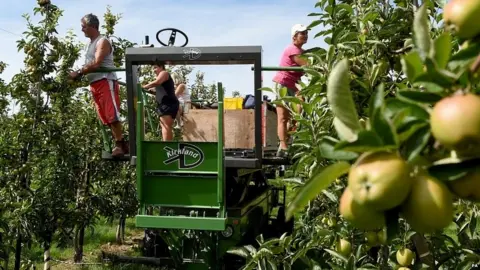Why immigration debate is far from over
 PA
PAThe prime minister has at least two big reasons for wanting to get this right.
For Theresa May, the referendum result was a clear instruction from the British people that they wanted to reduce the levels of immigration. Politically, therefore, she believes it's a demand she has to meet.
And as home secretary for six years, when the government continually flunked its own immigration target, the new system that will control immigration is finally, perhaps, a chance to meet her own long-missed goal.
So Wednesday's mega-leak from the Home Office of the potential design of the post Brexit system is significant.
Many of the proposals in it are not a surprise - the requirement for EU citizens who want to move to the UK long term after Brexit to register with the authorities, for example. You can read more of the extensive details here. One source involved in the negotiations says the "general principles" of the document are indeed an accurate reflection of the government position.
But it's far from the final version. And much of the uncertainty lies around what happens on "D+1", the day after we leave the European Union.
The implication from the document is that as soon as we leave, freedom of movement is over.
Although ministers have said as much on the record before, and Downing Street sources are adamant that will be the case, it pulls against indications in Whitehall a few months ago that the principle whereby EU citizens could come to live and work freely in the UK could carry on uninhibited during a transition period, the couple of years following Brexit itself.
One extremely senior source was, in fact, categorical that would be the case, and implied that had been agreed by ministers, as part of the acceptance that a transition period of some sort was inevitable. Not, it seems now, the case.
Couple those mixed signals with the leak of this document, and it points to a very live debate taking place right now in government.
I am told there was a series of meetings last week, involving the Home Office, the Treasury, Downing Street, and the Brexit department, about how to fulfil Theresa May's political imperative on immigration as quickly as possible, without creating howls of alarm from business or denting the economy.
In fact, since the draft was written, only last month, there have been six new versions of the proposals, none of which has yet been to cabinet, with the final version due in a White Paper later this autumn.
One source involved in the discussions said: "I'm not going to pretend it's an easy job," and in reality much of the detail is a long, long way off.
That's partly because the longer term plans will be informed by a big study looking at what the economy needs, which the government has only recently commissioned, and, inevitably, much of the policy that will cover the period immediately after Brexit will be subject to the negotiations between the UK and the EU.
It is also because even this big detailed document doesn't even really begin to fill in the blanks for phase three, the years that will follow the transition period, the eventual destination.
Who said anything about Brexit would be easy?
